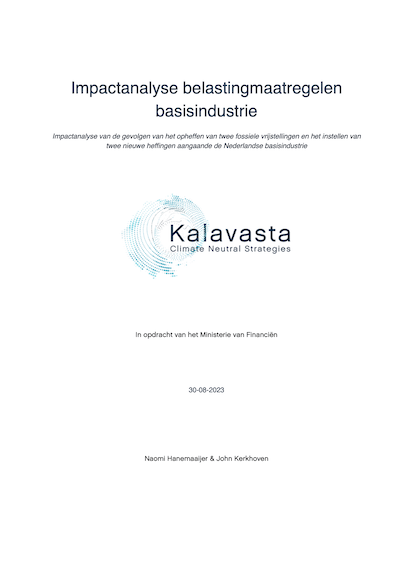Fossil Tax Exemptions
The Ministry of Finance requested us to investigate the impact of four tax measures for the Dutch base industry.

What was the motivation behind this study?
There has been more and more public debate about the rate at which greenhouse gases are being reduced and the role of taxes paid on fossil energy carriers and feedstock in the energy transition. The government has therefore started an inventory of all fossil tax exemptions, discounts and adjusted tax rates. This study was one of the studies in the context of that inventory. In this study, the Ministry of Finance, in collaboration with the Ministry of Economic Affairs and Climate Policy and the Ministry of Infrastructure and Water Management, wants to provide more insight to the cabinet and the House of Representatives into the scope and effects of four tax measures. The four tax measures include the abolition of two exemptions and the introduction of two new levies for the Dutch base industry.
How was this study carried out?
We were asked to analyze the impact of four measures: the abolishment of the exemption of coal tax (in Dutch: kolenbelasting) for dual use of coal, affecting steel producers (Tata Steel); the abolishment of the exemption of energy tax for the non-energetic use of natural gas, affecting fertilizer producers (OCI, Yara), industrial gases producers (Air Products, Air Liquide) and methanol producers (BioMCN); a levy on the non-energetic use of naphtha and LPG, affecting steam crackers (Shell Moerdijk, Dow, Sabic) and an energy tax on the energetic use of waste gases, affecting refineries (Shell Pernis, BP, ExxonMobil, Zeeland Refinery, Gunvor, VPR), steam crackers (Shell Moerdijk, Dow, Sabic) and steel producers (Tata Steel).
In the impact analysis, we attempted to estimate the consequences for these tax measures on the (non-)energetic demand, emissions and taxes on energy and emissions paid for the affected companies for the period 2030 – 2040.
For each tax measure, we described the production process of the companies concerned and the current taxes on energy and emissions paid. Then we defined a number future perspectives for the companies, in which fossil fuels or feedstock were (partially) replaced with alternative fuels, feedstock or the demand reduced due to a change in production processes. For each variant, we used to Carbon Transition Model to quantify the energy and feedstock consumption and the emissions. Next, we quantified the taxes paid on energy and emissions (the ETS right and the CO2 levy, energy tax and the investigated measure) in 2030 and 2040 for each variant. We compared the total taxes paid on energy and emissions with the net profit of the company in 2017-2021 based on public data. Finally, we answered 20 questions that may arise in the decision-making regarding the tax measure.
A first version of the analysis was discussed with all companies individually, to ensure that the quantification of energy demand and emissions does not deviate significantly from their own estimate.
How will the results from this project be used?
The results of the impact analysis will be used by the ministry on Finance in the decision-making process regarding the four individual tax measures. The decision to abolish the exemption of coal tax (in Dutch: kolenbelasting) for dual use of coal, had already been decided on before onset of the project and this will be implemented from January 1st 2028.
